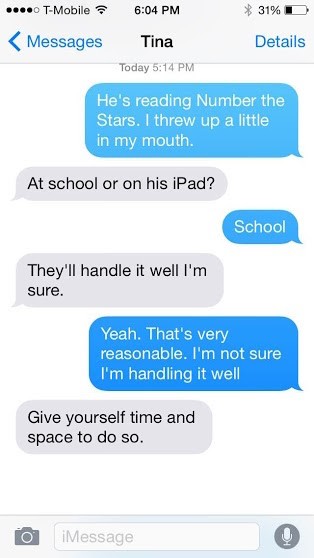It was just an ordinary moment at first. Ian was packing his things to leave school as I stood by his side. He had just finished his flute lesson and we went to his locker and he was putting his things into his backpack so we could go home. And then it felt like a movie suddenly. Time slowed down. Sound distorted. In his hand, going from his locker shelf to his backpack was Number The Stars, a historical fiction book about the escape of a Jewish family from Copenhagen during World War II. At the sight of it in my dear child’s hand, moving from his locker shelf into his backpack, my stomach lurched. I swallowed down the bit of vomit that had landed in my mouth, and managing a casual tone said, “You’re reading Number the Stars?”
Three years ago I had reflected on why I found Holocaust books so hard to read to my son. My own traumatic beginning to my Holocaust education had left me feeling completely ill equipped to help him begin his. I had come to terms with supporting 4-year-old Ian in reading an age appropriate Holocaust book, and I had even bought some books for 7-year-old Ian and set aside my own visceral panic to read them with him.
Now my 10-year-old Ian was reading one of the very books I had ended that reflection referring to, one of the very books I feared was in his future. A Holocaust book geared toward upper elementary students, Number The Stars is certainly an appropriate choice for him. But my own history meant that panic was building in me. He was ready for this. I was not.
Moments later we were in the car. I can act well at times like this. I can act like a sane person for him and get in the car and drive. But inside I’m panicking. I can feel my heart beating faster and faster and the tears are silently flowing. He’s reading in the backseat and I’m quiet so he doesn’t notice. “It’s my terror, not his” I think in my head. He’s fine. He’s fine. “Breathe and drive carefully” becomes my mantra. I just want to be home suddenly. I want so badly to be home. So I keep reminding myself to breath and drive carefully, paying extra attention to cars around me, pedestrians approaching crosswalks, focusing on my breathing and the importance of driving safely.
Home for a bit he was playing in the other room, while I locked the bathroom door and let the tears come more forcefully, yet still careful to stay quiet.
My wife is wise, so I try to do just that. I know, I KNOW, that this is MY issue. He is fine. He is safe. He is not being traumatized. Tina calls and I’m still crying although less now. She points out she can be the one to work on his reading with this one and I agree that would be best.
Later, as they do work on the book, I put on my earbuds and listen to my own audio book, puttering around the house putting laundry away, staying out of earshot.
Texting with my sister later, she wisely points out that it’s his last year in a Jewish elementary school and probably good for him to read it there, in his community, where they have the religious and cultural context. Yep. True. To an extent everyone is trying to be rational with a part of me that just isn’t rational. And at least I know that.
Ian has no clue about any of this. I’ve never told him about my experience in any way. I don’t think he’s even ever noticed that I find it hard to read holocaust books. I cover well, hold the panic in until he can’t see it, and truly I’ve gotten better. I can now read him some of the picture books we’ve collected over the years, or ones he find at the library, without feeling my heart race. It HAS gotten easier.
And I am SO grateful that he is in a place where his wise teachers can thoughtfully teach him this stuff. He will go off to school today and have meaningful learning about Yom HaShoah, by a team who is doing this VASTLY better than what was done for me. I can just back off and know they’ve got this. Because it’s still true – it’s still MY terror and not his.


